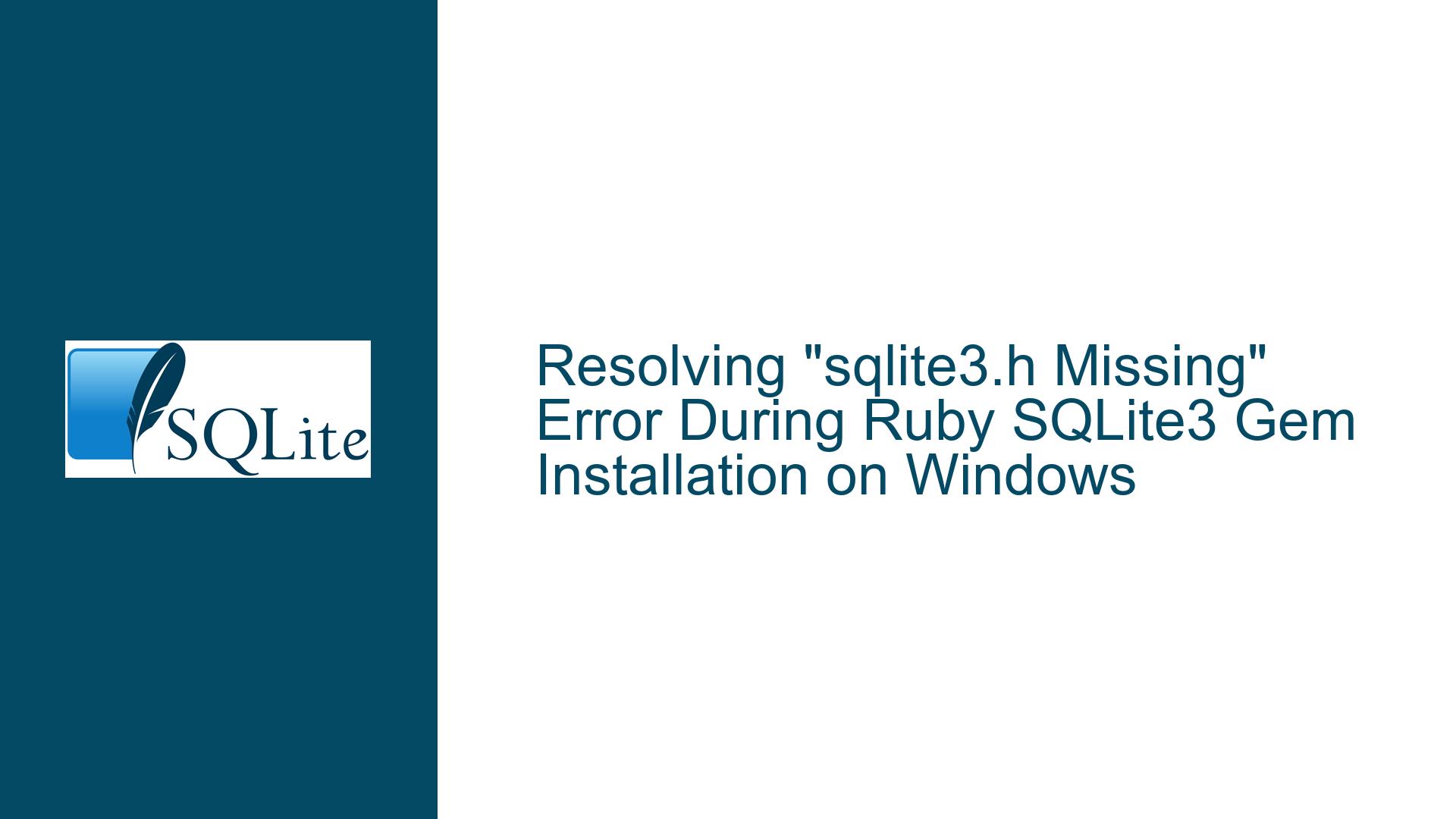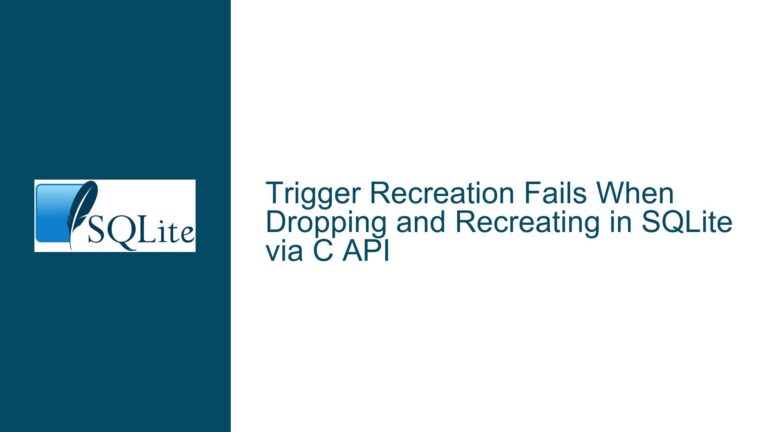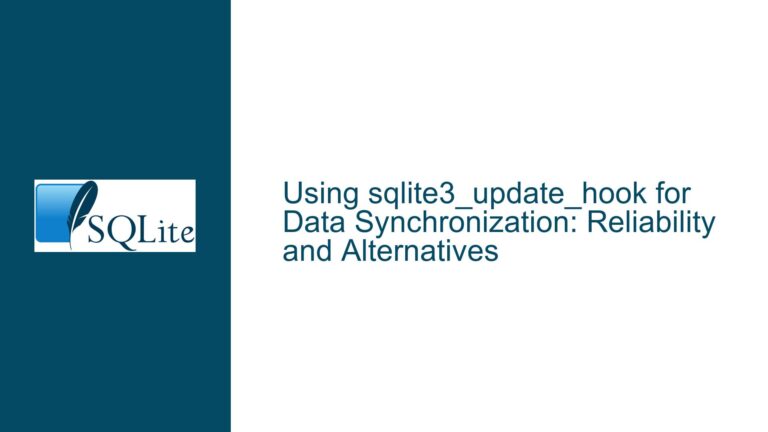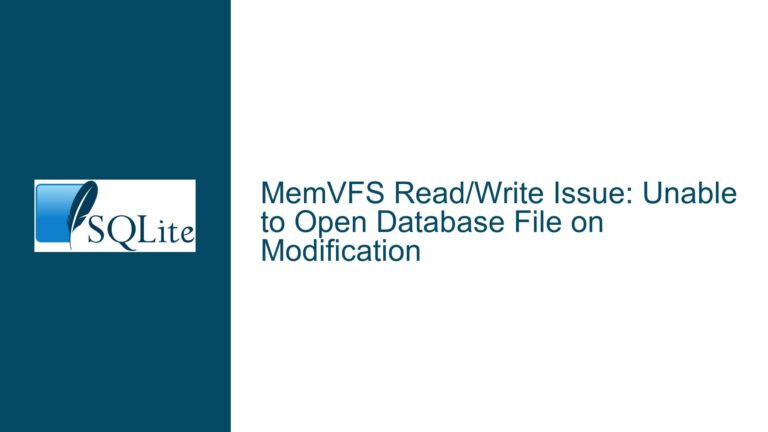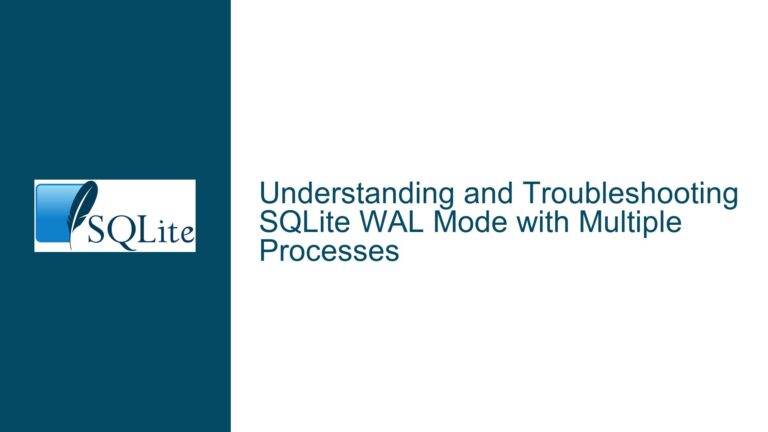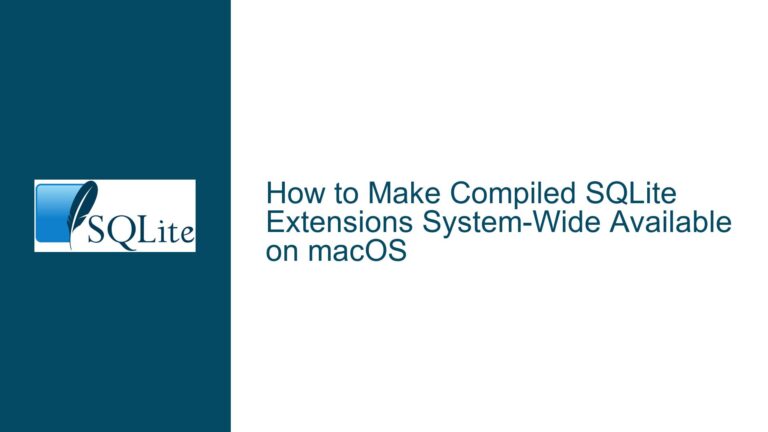Resolving “sqlite3.h Missing” Error During Ruby SQLite3 Gem Installation on Windows
Issue Overview: Understanding the SQLite3 Development Dependency Conflict
The error message sqlite3.h is missing during the installation of the sqlite3 Ruby gem (version 1.4.2) indicates a failure to locate critical components of the SQLite C library required for compiling native extensions. This issue arises when the RubyGems installer attempts to build the sqlite3 gem, which acts as a bridge between Ruby and the SQLite database engine. The gem relies on the SQLite C library’s header files (sqlite3.h, sqlite3ext.h) and precompiled binaries (sqlite3.lib, sqlite3.dll) to function. These files are not included in the gem itself, as SQLite is a separate dependency.
The error is most prevalent in environments where SQLite’s development files are not installed or are not discoverable by the build process. On Windows systems, this is particularly common because SQLite’s development headers and libraries are not distributed with the operating system or standard Ruby installations. Unlike Linux distributions, where package managers simplify the installation of development dependencies (e.g., libsqlite3-dev on Debian-based systems), Windows requires manual intervention to provide these files.
The sqlite3 gem’s native extension uses the mkmf (Makefile Maker) module in Ruby to locate SQLite’s headers and libraries. If mkmf cannot find sqlite3.h in standard system paths or directories specified in environment variables (e.g., INCLUDE, LIB), the build process halts. This dependency chain is critical: the Ruby gem cannot operate without the underlying SQLite library. Misconfigurations in the Ruby development environment, outdated versions of SQLite, or incomplete installations of SQLite exacerbate the problem.
Possible Causes: Identifying Gaps in Dependency Management
Absence of SQLite Development Files
The SQLite C library consists of two primary components: the runtime binaries (e.g., sqlite3.dll) and the development files (sqlite3.h, sqlite3.lib). The runtime binaries are often installed alongside applications that use SQLite, but the development files are omitted unless explicitly downloaded. Users who install SQLite from unofficial sources or precompiled binaries lacking headers will encounter this error.
Incorrect Installation Paths for SQLite Headers and Libraries
Even if SQLite development files are present, the RubyGems installer may fail to locate them if they reside in non-standard directories. On Windows, the build process expects these files in specific locations, such as C:\SQLite or directories listed in the INCLUDE and LIB environment variables. If SQLite is installed in a custom path (e.g., D:\Libraries\SQLite), the installer will not detect it without explicit configuration.
Mismatched Architectures (x86 vs. x64)
Ruby installations on Windows are available in 32-bit (x86) and 64-bit (x64) variants. The sqlite3 gem’s native extension must match the architecture of both Ruby and the SQLite library. For example, a 64-bit Ruby installation requires a 64-bit build of SQLite. Mixing architectures—such as linking a 32-bit SQLite library with a 64-bit Ruby—causes compiler errors and prevents the gem from installing.
Outdated or Incompatible SQLite Versions
The sqlite3 gem version 1.4.2 was released in 2020 and may not support the latest SQLite versions. If the system has SQLite 3.40.0 (released in 2022) installed, the gem’s source code might lack compatibility with newer APIs or features. Conversely, using an outdated SQLite version with a newer gem could also lead to conflicts.
Missing Build Tools for Ruby Extensions
Compiling native Ruby extensions on Windows requires the Microsoft Visual C++ (MSVC) runtime and development tools. The Ruby Installer for Windows typically includes the MSYS2 DevKit to provide these tools. If the DevKit is not installed or configured properly, the build process cannot execute, leading to secondary errors that obscure the root cause.
Ruby Environment Configuration Issues
Ruby versions and gem dependencies can introduce subtle conflicts. For example, Ruby 3.0 introduced breaking changes to the mkmf module, affecting how native extensions are built. Users who upgrade Ruby without reconfiguring their development environment may experience regressions.
Troubleshooting Steps, Solutions & Fixes: Resolving the Missing Header Dependency
Step 1: Install SQLite Development Files
Download the SQLite amalgamation source code from the official website (https://www.sqlite.org/download.html). The amalgamation is a single sqlite3.c file and two headers (sqlite3.h, sqlite3ext.h), which simplify integration with third-party projects. Extract the ZIP archive to a permanent directory, such as C:\SQLite.
Verify the presence of sqlite3.h in the extraction directory. If using precompiled binaries (e.g., sqlite3.dll), ensure they match the architecture (x86/x64) of your Ruby installation.
Step 2: Configure Environment Variables for Build Tools
Add the SQLite include and library directories to the system’s environment variables:
- Set
INCLUDEtoC:\SQLite(or your extraction path). - Set
LIBto the directory containingsqlite3.lib(if using precompiled binaries).
On Windows, these variables can be configured via System Properties > Advanced > Environment Variables. After updating the variables, restart any open command prompts to apply changes.
Step 3: Install the Ruby Installer DevKit
Download the MSYS2 DevKit from the RubyInstaller for Windows website (https://rubyinstaller.org/downloads/). Select the DevKit matching your Ruby version (e.g., msys2-x86_64 for 64-bit Ruby). Follow the installation instructions to bind the DevKit to your Ruby environment.
Run ridk install from the command prompt to install MSYS2 components and ensure the build tools (e.g., gcc, make) are available.
Step 4: Specify SQLite Paths During Gem Installation
Install the sqlite3 gem with explicit paths to the SQLite headers and libraries:
gem install sqlite3 -v '1.4.2' --platform=ruby -- --with-sqlite3-include="C:\SQLite" --with-sqlite3-lib="C:\SQLite"
The --platform=ruby flag forces the use of native extensions instead of precompiled binaries. The --with-sqlite3-include and --with-sqlite3-lib options direct the compiler to the necessary files.
Step 5: Validate SQLite Installation with Standalone Test
Create a simple C program (test_sqlite.c) to confirm SQLite is accessible:
#include <sqlite3.h>
#include <stdio.h>
int main() {
printf("SQLite version: %s\n", sqlite3_libversion());
return 0;
}
Compile and run the program using GCC from the DevKit:
gcc -I C:\SQLite -L C:\SQLite -lsqlite3 test_sqlite.c -o test_sqlite
./test_sqlite
Successful execution confirms SQLite is correctly installed.
Step 6: Use Precompiled Windows Binaries for the Gem
If compiling from source fails, install a precompiled sqlite3 gem binary. Specify the x64-mingw32 platform:
gem install sqlite3 -v '1.4.2' --platform=x64-mingw32
This bypasses the need for local SQLite development files by using a gem built for Windows.
Step 7: Update Gem and SQLite Versions
Upgrade to a newer sqlite3 gem version (e.g., 1.6.6) that supports modern SQLite releases. Edit your Gemfile:
gem 'sqlite3', '~> 1.6.6'
Run bundle update sqlite3 to apply the change. Ensure your SQLite installation is updated to the latest version.
Step 8: Switch to a Bundled SQLite Approach
Modify the sqlite3 gem’s configuration to statically link SQLite. Clone the gem’s source code:
git clone https://github.com/sparklemotion/sqlite3-ruby.git
cd sqlite3-ruby
Place the SQLite amalgamation files in the ext/sqlite3 directory. Edit extconf.rb to include:
require 'mkmf'
append_cflags('-DSQLITE_OMIT_LOAD_EXTENSION')
create_makefile('sqlite3/sqlite3_native')
Compile the gem with rake gem and install the resulting .gem file.
Step 9: Verify Ruby and System Architecture Consistency
Confirm that Ruby and SQLite are both 32-bit or 64-bit. Run ruby -v and check for x64 or i386 indicators. Use the file command on Unix-like systems to inspect sqlite3.dll (Windows users can check via Properties > Details).
Step 10: Leverage Package Managers for Dependency Handling
Install SQLite via Chocolatey (Windows package manager):
choco install sqlite --params="/InstallDevelopmentFiles"
This ensures headers and libraries are placed in standard system directories.
Step 11: Temporary Workaround with SQLite3-Ruby Binaries
If persistent issues occur, use the sqlite3-ruby binaries hosted on GitHub. Download the DLL and header files from the gem’s repository and manually place them in the Ruby environment’s include and lib directories.
Step 12: Consult Ruby Community Resources
Engage with Ruby-specific forums (e.g., RubyTalk, Stack Overflow) for platform-specific insights. The SQLite team does not maintain Ruby bindings, so collaboration with Ruby developers is essential for resolving edge cases.
By methodically addressing the SQLite dependency chain, configuring build tools, and aligning system architectures, users can resolve the sqlite3.h error and successfully install the sqlite3 gem. Persistent issues warrant deeper inspection of environment variables, compiler outputs, and dependency versions to isolate incompatibilities.
